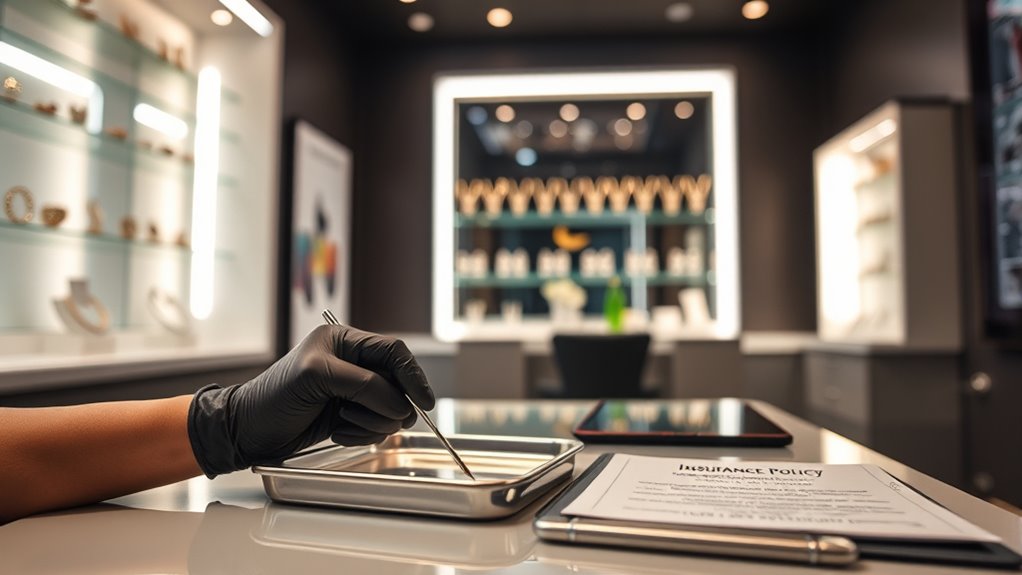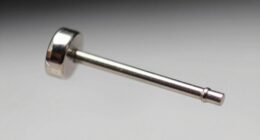To protect your piercing studio, you need several key policies. General liability insurance covers accidents, injuries, and claims from clients. Tattoo artist liability protects against allergic reactions and infections. Property coverage safeguards your equipment, jewelry, and premises from damages like fire or theft. You might also consider workers’ compensation if you have staff. Combining these policies helps manage risks and keeps your business protected. Keep going to find out more about customizing your coverage to fit your needs.
Key Takeaways
- General liability insurance covers bodily injury, property damage, and legal costs for piercing professionals.
- Professional liability (malpractice) insurance protects against claims related to adverse reactions or infections.
- Property insurance safeguards equipment, jewelry, and studio assets from damage or theft.
- Workers’ compensation policies cover staff injuries and related medical expenses.
- Combining policies and understanding exclusions ensures comprehensive protection for piercing studios.

Starting a piercing studio can be exciting, but it also comes with risks that you need to manage effectively. One of the most important steps is securing the right insurance policies to protect your business, your clients, and yourself. Without proper coverage, a single incident could lead to significant financial setbacks or even threaten the future of your studio. When considering insurance options, you should pay close attention to policies like tattoo artist liability and studio property coverage, as they are essential components of a comprehensive risk management plan.
Tattoo artist liability is crucial because it covers you in case a client experiences an adverse reaction, infection, or allergic response to a piercing. Even with strict hygiene protocols, complications can happen, and being financially protected against potential lawsuits or claims is vital. These policies typically cover medical expenses, legal fees, and settlement costs if a client sues you for damages. Having tattoo artist liability coverage not only offers peace of mind but also demonstrates professionalism and responsibility to your clients, reassuring them that you’re prepared to handle unexpected issues.
Tattoo artist liability protects you from lawsuits due to reactions, infections, or allergies.
In addition to liability coverage, studio property coverage is equally important. Your studio property includes all your equipment, jewelry, furniture, and other assets necessary for your daily operations. Accidents like fire, theft, vandalism, or natural disasters can damage or destroy your property, leaving you unable to operate and forcing you to cover costly repairs or replacements out of pocket. Studio property coverage helps you recover financially by paying for repairs or replacing damaged items, ensuring your business can resume normal operations without delay. It also provides protection for your business records, signage, and any specialized tools that are vital to your craft.
You should also consider combining these policies with other forms of coverage, such as worker’s compensation if you employ staff, or general liability insurance for broader protection. These policies work together to create a safety net that shields your studio from various risks. When shopping for insurance, always review the policy details carefully, ensuring it covers the specific hazards associated with piercing studios. Ask your provider about the extent of coverage for both tattoo artist liability and studio property, and clarify any exclusions or limitations.
Additionally, understanding the role of necessary cookies and other cookie categories can help you better appreciate the importance of comprehensive risk management, including insurance coverage, to protect your business from unforeseen issues. Ultimately, investing in the right insurance policies is a proactive step that shows your commitment to safety, professionalism, and responsible business management. It helps you mitigate potential losses and focus on growing your studio and serving your clients with confidence. With proper coverage in place, you’ll be better equipped to handle whatever challenges come your way, allowing your passion for piercing to thrive without unnecessary worries.
Frequently Asked Questions
Do Piercing Studios Need Liability Insurance if They’Re Licensed?
You might wonder if licensed piercing studios need liability insurance. The answer is yes, because licensing requirements often mandate liability coverage to protect against legal claims and accidents. Even if not required by law, having liability insurance is a smart move. It safeguards your business, covers potential damages, and ensures you’re prepared for any unforeseen incidents, providing peace of mind while complying with licensing standards.
How Much Does Piercing Studio Insurance Typically Cost Annually?
Piercing studio insurance costs vary due to pricing variability and coverage options. Typically, you can expect to pay between $500 and $2,000 annually, depending on your coverage limits and added protections. Factors like location, studio size, and services offered influence the price. To find the best fit, explore different policies and compare coverage options, ensuring you’re adequately protected without overspending on unnecessary extras.
Are There Specific Policies for Tattoo and Piercing Combined Studios?
Imagine your studio becoming the ultimate one-stop shop, combining tattoo and piercing services! You’ll need specific policies that cover both, especially since studio licensing and health regulations are strict. These specialized policies defend you from unique risks, like cross-contamination or licensing issues. By securing the right coverage, you ensure your combined studio stays compliant, safe, and thriving, giving your clients peace of mind and your business unbeatable protection.
What Are Common Exclusions in Piercing Studio Insurance Policies?
When reviewing piercing studio insurance policies, you should watch for common exclusions like liability limitations and equipment exclusions. Liability limitations can restrict coverage for certain claims, while equipment exclusions might leave you unprotected if your tools or jewelry are damaged or cause injury. These exclusions are standard but make certain you understand them fully to avoid surprises, and consider discussing options with your insurer to tailor coverage that best fits your studio’s needs.
Can Insurance Coverage Be Customized for Different Piercing Techniques?
You can customize insurance coverage based on your specific piercing techniques. When you work with your insurer, discuss your unique procedures to make certain your policy adequately covers potential risks. Coverage customization allows you to add endorsements or specific protections tailored to different piercing methods, reducing gaps in protection. This way, you get extensive coverage that aligns with your studio’s services, giving you peace of mind and protecting your professional reputation.
Conclusion
Protecting your piercing studio isn’t just smart—it’s essential. With 1 in 5 studios experiencing a claim each year, having the right insurance safeguards your reputation and finances. By securing extensive policies, you guarantee quick recovery from unexpected setbacks and continue providing safe, professional services. Don’t leave your business exposed—invest in the right coverage today, so you can focus on creating art and building trust with your clients. Your studio’s future depends on it.
















